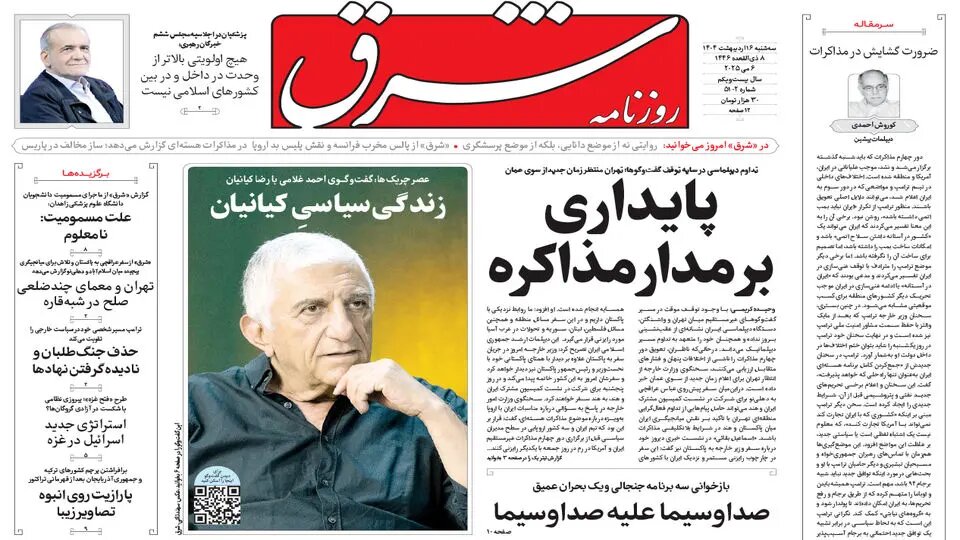Tehran – In a memo, Sharg tackled Paris’s disruptive approach to Iran’s nuclear talks.
It writes: The statement of French Foreign Minister Jean Noel Barott reflects Paris’s two-sided, divisive approach and is a factor in the European Union’s foreign policy towards nuclear negotiations between Tehran and Washington. Accusations such as “Iran, which acquires nuclear weapons or Iranian missiles that threaten Marseille” simply escalate tensions and justify Paris’ unrealistic statements without credible evidence. While France could have played a constructive role in fostering consultations as one of the JCPOA parties, Barott’s approach demonstrates a conflicting approach that is not consistent with the spirit of diplomacy. This disruptive approach could lead to a decrease in Iran’s motivation to continue consultations in situations where Tehran-Washington talks require a positive atmosphere and mutual trust. To ensure that it does not lose its diplomacy potential, Paris should stop setting unrealistic conditions and sanctions threats and instead focus on the JCPOA nuclear framework.
Ettelaat: You shouldn’t wait for America
In an interview with international affairs analyst Foad Izadi, Ettelaat dealt with domestic issues after the postponement of negotiations between Iran and the US. He said: To improve the terms, we need to focus on domestic assets and possibilities, and negotiations can undoubtedly bring about more achievements in the country. It is at the hands of the US Congress to lift sanctions, but most of the members of Congress are supporters of Netanyahu and Israel. Therefore, we cannot wait for the sanctions to be lifted. Therefore, we should try to interact with countries that want to cooperate with Iran. In fact, we should learn their promises from the dishonesty of Americans and rely on assets instead of fruitless negotiations and looking at the West. It is a strategic mistake to think of sanctions as the sole cause of the problem. So instead of waiting for the US and European countries, let’s look to work with neighboring countries and focus on national administration expertise. This way you can solve the problems one by one.
Arman-e-Melli: Trump won’t leave negotiations
Arman-e-Melli spoke with international relations analyst Morteza Makki about the ambiguous outlook surrounding negotiations between Iran and the US. He said: With the postponement of the fourth round of Iran-US negotiations and the rejection of the waltz (Trump’s national security adviser), the outlook for the nuclear talks is vague. When Trump entered the White House, he announced he would soon resolve the Ukraine crisis, but this did not happen. In these circumstances, Trump needs important achievements in the international field. It is unlikely that Trump will reach an agreement with Iran in the short term and will present it as a significant international outcome. The termination of the waltz could even be assessed as a positive signal to reach an agreement with Iran. It is unlikely that Trump will leave the table negotiating with Iran at this stage. This is currently the case, Iran has a serious will to reach an agreement. Things have changed and today Iran is serious about reaching an agreement. The key point in this regard is that Iran is in a very sensitive situation, which is why it made the best decision, dialogue and diplomacy.
Javan: Trump is not trying to get stuck in negotiations
In his commentary, Javan wrote: After the incident on October 7th, Iran emerged as a greater threat to the Zionist regime, which led their Israeli-US joint think tanks to reach negotiation options. While the Zionist regime is trying to express dissatisfaction with the negotiations through anti-Iranian rhetoric, texts and hypertexts in statements from Zionist regime officials indicate that the regime’s opposition is not related to negotiations. Even if the demands of Israeli lobbyists were pursued by Trump, the administration is pleased with it. As Trump announced last week after a phone conversation with Netanyahu, he agrees with him on all the issues. For this reason, the US is aiming to gradually return pressure on Iran to a point, but is trying not to bring negotiations to a deadlock. They want to impose conditions on the continuation of consultations and propose an American “list of requirements.”

